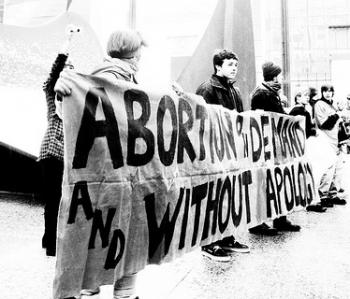Imagine facing an unplanned pregnancy and having an important choice to make: to have/keep the baby, have/give up baby for adoption, end the pregnancy. Image thinking your options through and choosing to get an abortion — which is your legal right in Canada.
Imagine, then, going to see your family doctor (if you are lucky enough to have a family doctor) and because they do not agree with your right to get an abortion on ideological grounds, you cannot have one. How would you feel? Imagine having to go see two separate doctors to get their “approval.”
This is the reality faced by many New Brunswick women. Under regulation 84-20 of the Medical Services Act, abortion services are only covered under Medicare if: “the abortion is performed by a specialist in the field of obstetrics and gynecology in a hospital facility approved by the jurisdiction in which the hospital facility is located and two medical practitioners certify in writing that the abortion was medically required.”
Can someone please explain to me when a safe and legal abortion to end an unwanted pregnancy is not a medical necessity? There is no medical reason for this regulation. It is ideological and it was put in place to restrict access to abortion. New Brunswick is the only Canadian province that has the two-doctor rule. Never mind that Canadian law says that women can decide for themselves whether or not they get an abortion and that abortion services are an insured service available under Medicare.
How can our elected representatives impose their religious/personal beliefs and go against Canadian legislation. Part of the problem is that the federal government is not enforcing its legislation.
What about sex education you say. You are right, sex education is important. Having contraceptives readily available for men and women is also important, including emergency contraception (also known as the morning-after pill). Abortion should be a last resort and not a first resort. I agree. Unfortunately for many New Brunswick women, it is not an option at all.
Historically, women around the world have tried to end their unintended pregnancies whether abortion is legal or not, often jeopardizing their safety and health by self-inducing or seeking a dangerous illegal procedure. While there is very little relationship between abortion legality and abortion incidence, there is a strong relationship between abortion legality and abortion safety.
The opposite is actually true, where abortions are readily available, rates tend to decrease. For example: the abortion rate is 29 per 1,000 women of childbearing age in Africa and 32 per 1,000 in Latin America — regions in which abortion is illegal under most circumstances in the majority of countries. The rate is 12 per 1,000 in Western Europe, where abortion is generally permitted on broad grounds.
The closure of the Morgentaler clinic in July will make this essential service for women’s reproductive health even harder to obtain. The clinic performed about 60 per cent of abortions obtained in the province. In 2012, according to the annual statistical report released earlier this year by the Canadian Institute for Health Information (CIHI), 616 of the 1,058 abortions performed in the province were performed at the Morgentaler clinic (442 were performed in-hospital).
According to this same CIHI report, women of all age groups seek an abortion to end an unwanted pregnancy. Here is the breakdown in 2012 for abortions performed in hospital (statistics are not released for the abortions performed at the Morgentaler clinic): 17 per cent of abortions performed were on women 19 year of age and under; 33 per cent were on women aged 20-24; 23 per cent were on women aged 25-29; 15 per cent were on women aged 30-34 and 12 per cent were on women over the age of 35.
It’s time to turn the page on the question of making safe and legal abortion services readily available to New Brunswick women. It’s the law. Abortions in New Brunswick should be part of our publicly funded and publicly delivered health care services available to women throughout the province. Women do not need the government or two doctors to decide for them on matters of their reproductive health.
Our elected representatives can start by repealing the section of Regulation 84-20 that calls for two doctors to “approve” the medical necessity of an abortion to end an unwanted pregnancy. The government can then evaluate how it can make abortion services more readily available throughout the province. Right now only two New Brunswick hospitals perform abortions, reimbursed by Medicare.
Otherwise, what are our elected representatives saying about women’s reproductive health. It sounds like: “good luck, you’re on your own.” I shudder to think that some women may choose unsafe options to end their pregnancy.
Jody Dallaire lives and works in Dieppe New Brunswick where she writes a bi-weekly column on women’s equality issues and matters of social justice.
This article originally appeared on Times & Transcript and is reprinted with permission of the author.
Photo: Eyton Z/Flickr



